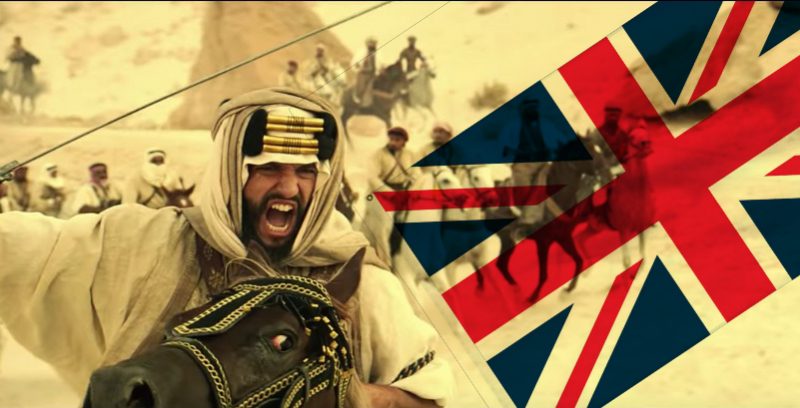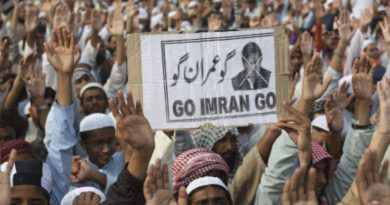MYTH: Did British Imperialism defeat Ottomans to create Kingdom of Saudi Arabia?
by Afreen Baig
Now, to refute yet another imprecise impression that persists resolutely —”British imperialism defeated Ottoman empire to create Saudi Arabia”—erroneous assertion!
Challenge is not that the study of British Imperialism has few students, but that British Imperialism has been distorted to suit fabricated biases and vested interests, often manipulated to deceive and generate a hostile perception, with sole intention to isolate any independent, sensibly functioning country—Saudi Arabia—being the target here.
The unification of the current Saudi State occurred during the period — 1902 till 1932 — almost 13 years before the UN was established in 1945.
Back then, Saudi Arabia and other Middle Eastern countries were recognised by the ruling powers, according to the persisting geo-political necessities, strategic alliances and the World Order that prevailed before the UN’s formation. Most countries recognised the Saudi State during these years (1902 – 1932).
The Islamic Conference, held in Riyadh on the 29th October 1924, brought a wide Islamic recognition and endorsement of Ibn-Saud’s jurisdiction over Makkah and Medinah.
This Islamic recognition was 21 years before the United Nations was established.
The British recognized Saudi Arabia in 1926, and the Republic of Turkey (formerly the Ottomans) also recognized Saudi Arabia in 1926.
Reasonable international relations and diplomacy do not forbid recognizing the international stature and power of countries that formed the “League of Nations” or the “United Nations’ in 1945.
There existed no country in the world that had not established diplomatic relations and military alliances with the British Empire—signed mutual treaties, preferential trade agreements, or hosted British diplomats.
Why British-Ottoman Treaties not questioned?
In 1619, Persian Empire granted trading privileges to East India Company. In 1675, England received privileged trading access to Ottoman empire. In 1793, East India Company Factory in Kuwait was established.
In 1596, a British diplomat Edward Barton accompanied the Ottoman Sultan Mehmet-III in his campaign against Hungary and was present at the siege of Eger.
In 1801, the Anglo-Turkish military forces conspired and captured Egypt, and collaborated further in the second Egyptian—Ottoman war of 1839.
In 1809, ‘Treaty of Dardanelles/Çanak”—signed between the British and Ottomans—ensured the British against entry of Russian fleet into the Mediterranean, reaffirming Britain’s privileged economic rights, and its secret provisions provided that the British assist the Ottomans against the French.
The 1833 peace “Treaty of Kutahya” saw the British empire support the Ottomans again, against Muhammad Ali’s Egypt.
The 1838 “Treaty of Balta Limani” was an Ottoman and British Commercial Treaty granting Britain preferential trading rights throughout Ottoman Empire.
In July 1913, there was yet another agreement between the Ottoman Empire and the British, known as the “Anglo-Ottoman Convention of 1913″—whereby the Ottomans surrendered its jurisdiction over the Persian Gulf, Kuwait, Qatar, Bahrain and Shatt al-‘Arab.
This 1913 Ottoman-Anglo Treaty was signed three years before the infamous oft quoted ‘The Sykes–Picot Agreement” of 1916. The Sykes–Picot agreement did NOT include the Arabian Peninsula.
How are these numerous Ottoman Treaties any different than the “Darin Treaty” of 1915 – signed between the Ruler Ibn Saud and diplomat Sir Percy Cox?
The Treaty between British and Saudi Arabia
The Darin Treaty 1915 was signed to indicate British recognition of the third Saudi State, and in return, Ibn Saud agreed not to attack British protectorates. Ibn Saud’s victory and seizure of Al-Hasa finally compelled the otherwise reluctant and neutral British to subsequently re-evaluate their policy towards Ibn Saud, resulting in signing of the “Darin Treaty”. Sovereign and equal international relations were established between these two supreme ruling powers.
Why is Sir Percy Cox’s role considered any different than that of William Harborne, Sir Edward Barton or Sir Thomas Roe’s role in the Ottoman Empire? Search these names up.
William Harborne’s services for “Turkey Company” are compared to those of Sir Thomas Roe’s to the East India Company.
The Unholy alliance between British and Ottomans
From 1583 to 1908—Ottoman empire collaborated with over 50 British designated diplomats. All attained British imperialism within the Ottoman empire, and secured preferential trade access, capitulations, tariff reductions, selective routes, privileged rights and struck military alliances.
Both, utilized commercial diplomacy to accomplish imperialistic objectives.
In 1831, the Governor of Egypt Mehmet Ali Pasha—once loyal to the Ottomans—decided to retaliate against the Ottoman Empire. To quell Mehmet Ali’s vengeance, the Ottomans appealed to the Russians, French and the British to intervene. The British taking advantage of the situation, defeated Mehmet Ali Pasha but in exchange, acquired exclusive access to Ottoman trade markets.
This same Mehmet Ali Pasha had once led an invasion against the Al-Saud in 1811, at the request of the Ottoman Sultan.
Why should then, the Arabs have trusted these treacherous Turk Ottomans or the faltering British empire over their sovereign independence?
Saudi Arabia is Independent
Saudi Arabia today is an independent sophisticated state, economically viable, socially developed, progressive, modern infrastructure, and ruled by sensible leaders. A testimony to the visionary decisions undertaken by the noble Abd al-‘Azīz ibn ‘Abd ar-Raḥman Āl Sa’ūd back in 1902 -1932.
Mainstream thinking should make a decisive shift, revert to balance-of-power thinking and study history objectively. Let it not be, “History is a set of lies agreed upon”—Napoleon Bonaparte.
“That men do not learn very much from the lessons of history is the most important of all the lessons that history has to teach”—Aldous Huxley
Afreen Baig is a regular writer on contemporary issues of Middle-East and the Arab World. She writes for the Milli Chronicle. She tweets under @afreenb179 and she can be followed on Facebook.



